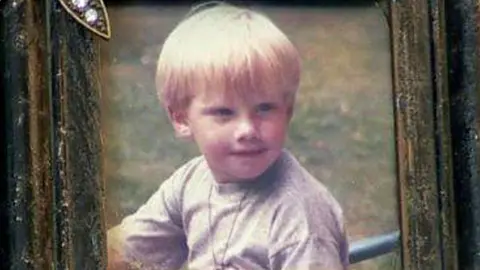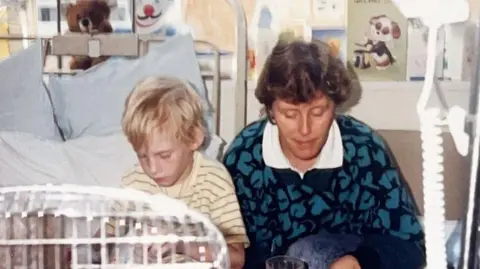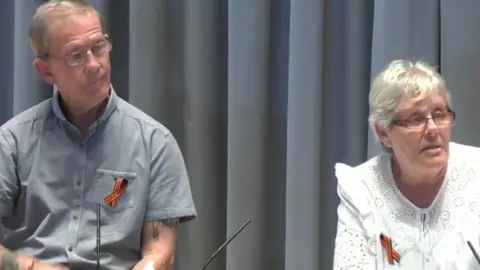Son's Aids death compensation is blood money - dad
 Family photo
Family photoThe father of a seven-year-old who died of Aids after being given infected blood has described the compensation being paid as "blood money".
Colin Smith, a haemophiliac from Newport, died in 1990 after being given infected blood products imported from the United States.
His father, also called Colin, said the interim compensation of £100,000 was "recognition" of what his son went through, but he still wanted people to be prosecuted.
Cabinet Office minister Nick Thomas-Symonds said the UK government was committed to ensuring that victims received compensation as swiftly as possible.
Colin and his wife Janet previously told the UK-wide infected blood scandal that they were told in a hospital corridor that their son had been infected with HIV when he was two.
The family suffered abuse, including graffiti being written on the side of their house and their children were bullied at school.
Mr Smith, 72, said he and his wife believed their son was used as part of a trial of blood products without their consent.
"I am pleased we have finally got recognition of what my son went through, but the money doesn't mean much to us," he added.
"It is blood money as far as I am concerned for what he went through.
"We are still hoping there will be some prosecutions, but that probably won't happen in my lifetime."
The Cabinet Office is responsible for the interim compensation payments, while the full compensation is the responsibility of the Infected Blood Compensation Authority (ICBA).
Mr Smith said a panel would decide how much the family were entitled to and it would be different to an adult due to the loss of earnings.
IBCA plans to make compensation offers to about 250 people by the end of March, which Mr Smith said meant the process was "dragging on" for families and others affected.
At least 300 victims from Wales were left with chronic or life-limiting conditions such as hepatitis or HIV after receiving contaminated blood products in the 1970s and 80s.
The UK government has set aside £11.8bn to compensate victims of the scandal. Payments are exempt from tax and will not affect benefits.
The final amounts are being assessed against five criteria: harm, social impact from stigma and isolation, effect on autonomy and private life, care costs and financial loss.
Mr Smith said hundreds of families and victims had supported each other over the years, but many were struggling and they still had to "jump through hoops".
"Colin, to them, was just a number on a machine," he added.
In a letter to the inquiry chairman, Mr Thomas-Symonds said officials had worked with families to ensure they could access the money to which they were entitled..
 Family photo
Family photoColin and Janet Smith gave evidence to the public inquiry in Cardiff in 2019.
Mrs Smith described how the 1980s Aids awareness advertising campaign had a "devastating" impact, ending with people scrawling "Aids - dead" on their house in 6ft-high letters.
"People going across the street from us, threatening to take their children out of school if Colin went there, it was devastating."
Mr Smith said he lost his job because his boss was scared he would lose customers while Colin's three older siblings were known as the "Aids kids" at school.
 Infected Blood Inquiry
Infected Blood InquiryIBCA interim chief executive David Foley said payments would be made "as soon as possible".
He added: "The infected blood community has been denied answers, justice and support for too long, and now is the time for transparency and action.
"Every single compensation claim is unique with complex circumstances. That is why we have started with a small number of people making the first compensation claims, building and improving the claim service as we go."
